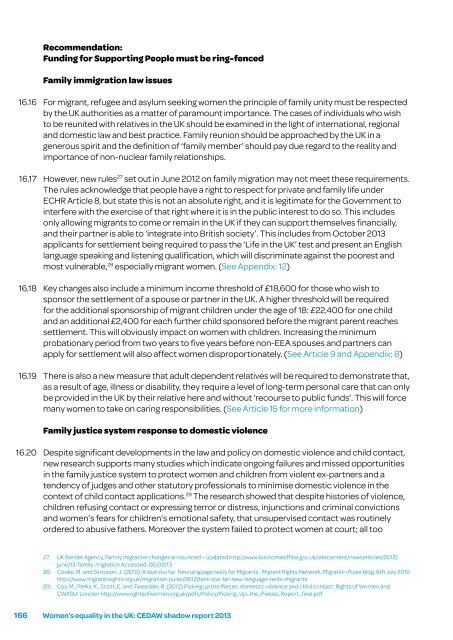Women’s equality in the UK – A health check
Women’s equality in the UK – A health check
Women’s equality in the UK – A health check
Create successful ePaper yourself
Turn your PDF publications into a flip-book with our unique Google optimized e-Paper software.
16.16<br />
16.17<br />
16.18<br />
16.19<br />
16.20<br />
Recommendation:<br />
Fund<strong>in</strong>g for Support<strong>in</strong>g People must be r<strong>in</strong>g-fenced<br />
Family immigration law issues<br />
For migrant, refugee and asylum seek<strong>in</strong>g women <strong>the</strong> pr<strong>in</strong>ciple of family unity must be respected<br />
by <strong>the</strong> <strong>UK</strong> authorities as a matter of paramount importance. The cases of <strong>in</strong>dividuals who wish<br />
to be reunited with relatives <strong>in</strong> <strong>the</strong> <strong>UK</strong> should be exam<strong>in</strong>ed <strong>in</strong> <strong>the</strong> light of <strong>in</strong>ternational, regional<br />
and domestic law and best practice. Family reunion should be approached by <strong>the</strong> <strong>UK</strong> <strong>in</strong> a<br />
generous spirit and <strong>the</strong> def<strong>in</strong>ition of ‘family member’ should pay due regard to <strong>the</strong> reality and<br />
importance of non-nuclear family relationships.<br />
However, new rules 27 set out <strong>in</strong> June 2012 on family migration may not meet <strong>the</strong>se requirements.<br />
The rules acknowledge that people have a right to respect for private and family life under<br />
ECHR Article 8, but state this is not an absolute right, and it is legitimate for <strong>the</strong> Government to<br />
<strong>in</strong>terfere with <strong>the</strong> exercise of that right where it is <strong>in</strong> <strong>the</strong> public <strong>in</strong>terest to do so. This <strong>in</strong>cludes<br />
only allow<strong>in</strong>g migrants to come or rema<strong>in</strong> <strong>in</strong> <strong>the</strong> <strong>UK</strong> if <strong>the</strong>y can support <strong>the</strong>mselves f<strong>in</strong>ancially,<br />
and <strong>the</strong>ir partner is able to ‘<strong>in</strong>tegrate <strong>in</strong>to British society’. This <strong>in</strong>cludes from October 2013<br />
applicants for settlement be<strong>in</strong>g required to pass <strong>the</strong> ‘Life <strong>in</strong> <strong>the</strong> <strong>UK</strong>’ test and present an English<br />
language speak<strong>in</strong>g and listen<strong>in</strong>g qualification, which will discrim<strong>in</strong>ate aga<strong>in</strong>st <strong>the</strong> poorest and<br />
most vulnerable, 28 especially migrant women. (See Appendix: 12)<br />
Key changes also <strong>in</strong>clude a m<strong>in</strong>imum <strong>in</strong>come threshold of £18,600 for those who wish to<br />
sponsor <strong>the</strong> settlement of a spouse or partner <strong>in</strong> <strong>the</strong> <strong>UK</strong>. A higher threshold will be required<br />
for <strong>the</strong> additional sponsorship of migrant children under <strong>the</strong> age of 18: £22,400 for one child<br />
and an additional £2,400 for each fur<strong>the</strong>r child sponsored before <strong>the</strong> migrant parent reaches<br />
settlement. This will obviously impact on women with children. Increas<strong>in</strong>g <strong>the</strong> m<strong>in</strong>imum<br />
probationary period from two years to five years before non-EEA spouses and partners can<br />
apply for settlement will also affect women disproportionately. (See Article 9 and Appendix: 8)<br />
There is also a new measure that adult dependent relatives will be required to demonstrate that,<br />
as a result of age, illness or disability, <strong>the</strong>y require a level of long-term personal care that can only<br />
be provided <strong>in</strong> <strong>the</strong> <strong>UK</strong> by <strong>the</strong>ir relative here and without ‘recourse to public funds’. This will force<br />
many women to take on car<strong>in</strong>g responsibilities. (See Article 15 for more <strong>in</strong>formation)<br />
Family justice system response to domestic violence<br />
Despite significant developments <strong>in</strong> <strong>the</strong> law and policy on domestic violence and child contact,<br />
new research supports many studies which <strong>in</strong>dicate ongo<strong>in</strong>g failures and missed opportunities<br />
<strong>in</strong> <strong>the</strong> family justice system to protect women and children from violent ex-partners and a<br />
tendency of judges and o<strong>the</strong>r statutory professionals to m<strong>in</strong>imise domestic violence <strong>in</strong> <strong>the</strong><br />
context of child contact applications. 29 The research showed that despite histories of violence,<br />
children refus<strong>in</strong>g contact or express<strong>in</strong>g terror or distress, <strong>in</strong>junctions and crim<strong>in</strong>al convictions<br />
and women’s fears for children’s emotional safety, that unsupervised contact was rout<strong>in</strong>ely<br />
ordered to abusive fa<strong>the</strong>rs. Moreover <strong>the</strong> system failed to protect women at court; all too<br />
27. <strong>UK</strong> Border Agency, Family migration changes announced <strong>–</strong> updated http://www.bia.homeoffice.gov.uk/sitecontent/newsarticles/2012/<br />
june/13-family-migration Accessed: 26/03/13<br />
28. Cooke, M. and Simpson, J. (2012) ‘A test too far: New language tests for Migrants’, Migrant Rights Network, Migration Pulse blog, 6th July 2012<br />
http://www.migrantsrights.org.uk/migration-pulse/2012/test-too-far-new-language-tests-migrants<br />
29. Coy, M., Perks, K., Scott, E. and Tweedale, R. (2012) Pick<strong>in</strong>g up <strong>the</strong> Pieces: domestic violence and child contact. Rights of Women and<br />
CWASU: London http://www.rightsofwomen.org.uk/pdfs/Policy/Pick<strong>in</strong>g_Up_<strong>the</strong>_Pieces_Report_f<strong>in</strong>al.pdf<br />
166 <strong>Women’s</strong> <strong>equality</strong> <strong>in</strong> <strong>the</strong> <strong>UK</strong>: CEDAW shadow report 2013


